Wildflowers, hawks & falcons
Daisy Fleabane (Erigeron strigosus)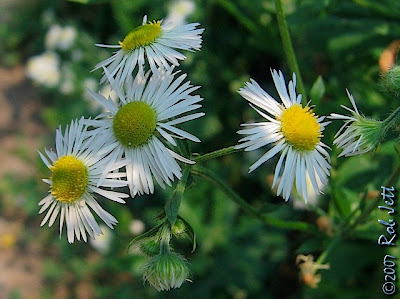
July 10th
On Wednesday I was checking the air in my bicycle's rear tire before riding across Prospect Park. Peter and I were meeting at his office on the opposite side of the park to take care of some computer related business. I was nearly out the door when my computer chimed. A new e-mail came in. I left my bike by my door and came back in for a quick look, just in case it was Peter with a last minute change of plans.
It was a note from Peter, but just a forwarded message. He had received a request for information sent to the Brooklyn Bird Club's website from a woman in my neighborhood. She thought that a pair of owls had taken up residence in a tree next to her home and wondered if it would be possible to help her identify them. I live only a short distance from her street, so I replied that I would be happy to check out the mystery birds when it was convenient for her.
It's a quick ride from my apartment to Peter's office in the Wollman Rink, especially since the route is a gentle downgrade. As I rode through the park, I tried hard to ignore the urge to look for the fledgling Red-tailed Hawks. I rode through the Ravine, paralleled a section of the stream and under Center Drive at the Nethermead Arches. I intentionally avoided going too near the Midwood, where I'd be likely to hear the young hawk's hoarse cries. It felt like I was riding with blinders on.
Copying the file from Peter's computer only took a couple of minutes. We talked briefly, then I headed off to check on the possible owls in the woman's backyard.
I cut across the rink parking lot and merged with the cars, bikes and runners heading north on Park Drive East. Center Drive intersects with that section of road at the south end of the Midwood. Instinctively, as if I were out birding, I made a left onto Center Drive. The towering trees of the Midwood were on my right, probably hiding a hawk from view, but I kept my focus on the road and getting home.
Prospect Park Fallkill Wildflower Meadow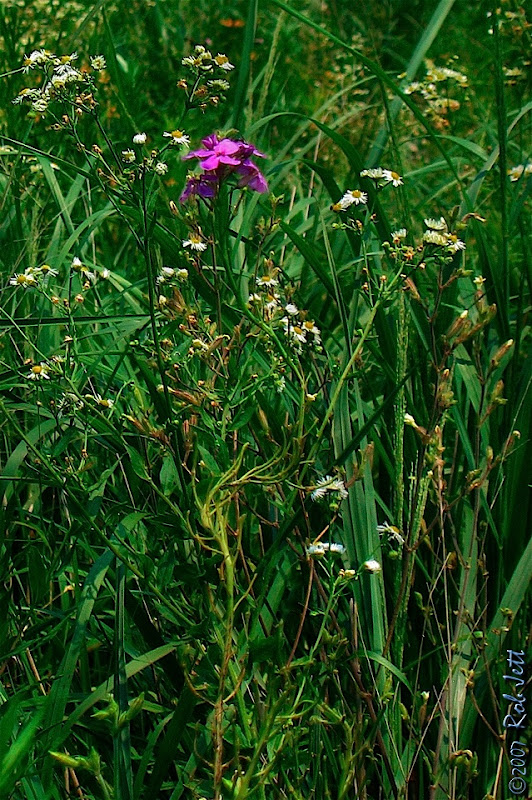
I've been known to get sidetracked easily, in fact, much of what I write about here is the result of my shifting focus. So it should come as no surprise that, as I approached the Nethermead Arches, despite the promise I made to myself, I stopped my bike and dismounted. There was a pathetic wailing "weeEE weeEE weeEE weeEE" coming from a treetop next to the Ravine.
Alice and Ralph had been slowly weaning their two very large offspring from free handouts. It happens every year at about this time. If it were possible to hear, there was probably a simultaneous chorus of unhappy, whining juvenile Red-tailed Hawks across the city's five boroughs. This particular youngster flew out over Center Drive, still calling, and headed toward the Quaker Cemetery. I followed on my bike. As I approached the cemetery I heard the second fledgling, then spotted him near the top of an oak tree on the Nethermead.
I stayed for a short time hoping to catch a glimpse of one of the young hawks attempting to hunt. An alarm that I had set on my cellphone startled me with a screeching reminder to get moving.
When I got home I had a email response from the woman with the owls. She wrote that I could stop over any time. Then she wrote the following:
"Thanks for getting back to me. We have had quite a bit of bird drama since I last wrote. Two fledgeling kestrels made their way to my front yard [...]. I think their nest is on the ledge of my house. One came on Sunday the other on Monday afternoon. The first was fat and had a hurt wing the second a bit smaller but just as cute. I called the raptor trust in NJ, who in turn gave me the number of Eileen Jones, a certified raptor rescue person. She came and got both birds. Meanwhile, I had contacted you about the two birds I often see in the back. They seem too big to be kestrels but I'm certainly not an expert.
If you want to help ID these bird please come by. Just ring the bell if it is ever convenient for you. You are always welcome. Oh yes I will try to get a picture of the couple in the back. I have pictures of the babies."
I couldn't believe it, I'd finally get to see the nest and possibly offspring for the kestrels that always pass over my roof! I gathered my gear together and rushed out of my apartment.
Linda opened her door and I introduced myself. She was expected Peter, but I explained that I was a friend and that he had forwarded me her email. I asked her about the kestrels that she rescued and she point out a nest on a ledge just below her roof. It was made out of grass and other plant material. The nest was slightly wider than the ledge, but held in place by pigeon spikes. I thought that kestrels only nested in cavities, but told Linda that I'd research it when I got home.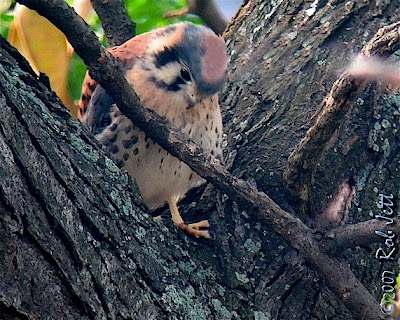
She showed me to her backyard then pointed up towards the crown of a sprawling locust tree. Without looking through my bins I knew that they were fledgling kestrels. The pair still had the cute, rounded face and fluffy appearance of young birds, but, unlike the two Linda rescued, seemed old enough that they could fly. In fact, not long after I began scanning the branches for any other fledglings, one took off. He flew over the roof, behind us and to our right.
Mom arrived at the tree with, what looked like, a House Sparrow for the remaining fledgling. It was difficult to see, so Linda suggested we go up one level. From there we could see a little better and spotted one of the adults zipping passed. We stayed there watching for a while, but still didn't have very clear views. At one point I could no longer see the young raptor as he had hopped towards the tree's trunk. Linda said that we could go up to the roof to get a better perspective.
Access to the roof was via a narrow, steel ladder from inside the house. When I climbed out onto the roof and stood up, one of the first things I noticed was the satellite dish atop St. Savior's High School. It made sense. I understood why the adult male liked that perch as he could keep an eye on his brood from a distance. He probably had several similar perches around the neighborhood. Back in the locust tree I relocated the young falcon. He was sleeping in the crotch of two branches. It would make a great photo, I thought, but there was a narrow branch cutting across the frame right at his head. I tried moving to different spots, but it was always obstructing part of the image. It wasn't until I got home and saw the photos on my computer that I realized the branch was butted right up against his head. It actually prevented him from sliding out of the tree as he slept. Smart bird.
Sleepy Kestrel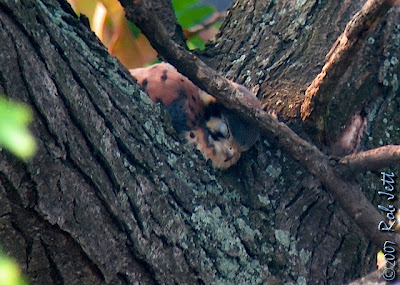
We stayed on the roof until he woke from his siesta. After a few minutes of preening and stretching he was ready for some flight practice. He took off flying right towards us, banked sharply to the right, made a wide arc over the connected backyards then came in for a landing on the opposite side of the tree from his starting point. The flight lasted for all of about 10 seconds. I guess he was still feeling a little stuffed from eating the sparrow.
Click here to see some baby kestrels
Canada thistle (Cirsium arvense)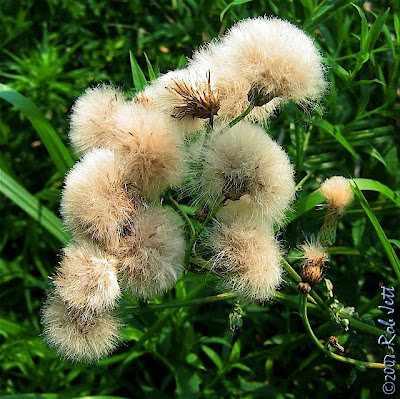
(pretty, but this is not a desirable plant for any garden)











3 comments:
love the kestrel pictures.
(Hey-- those thistles are such a treat for the little finch, tho)
Alice & Ralph's fledglings seems hard to avoid - they appear as though they are constantly around the Nethermead, Quaker Cemetary and the S. Long Meadow screeching over the baseball diamonds! Still, they are so much fun to watch.
I read this post with much pleasure, from the red-tails to the kestrels, amazing. How common are the kestrels around here? Are they in the park or more just in the n'hood zone?
Great post!! neal.
Love those kestrels...glad to see that they are doing well. Im currently working on a research project to count the density of nesting kestrels in nyc. I'll add these guys to the list. So can we assume that they had 4 young this year?
Post a Comment